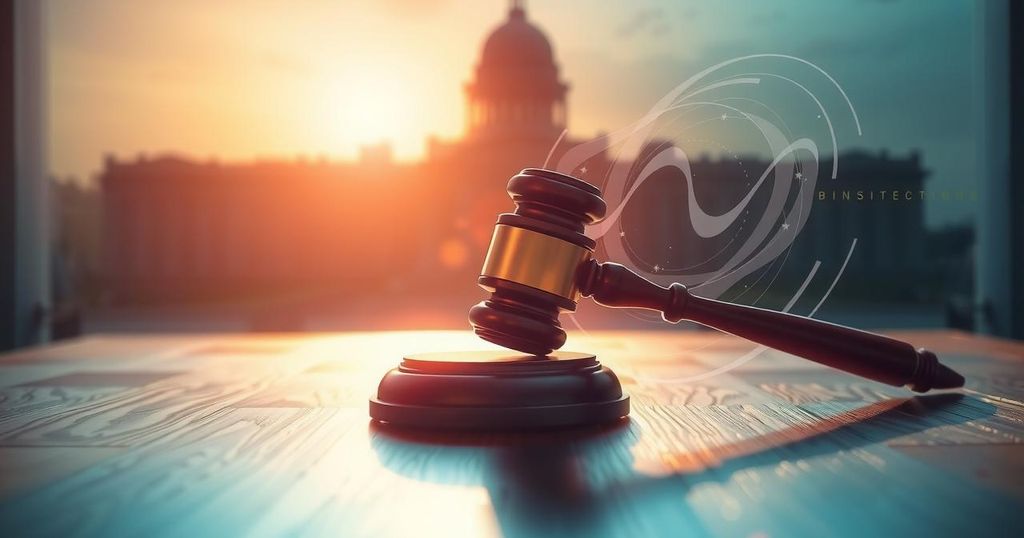Gabon Votes Overwhelmingly in Favor of New Constitution
Provisional results indicate that 91.8% of Gabonese voters approved a new constitution designed by military rulers. Key provisions include a two-term limit for presidency, no prime minister, and exclusive Gabonese candidacy requirements. The referendum faced criticism over its perceived promotional biases favoring the ruling junta during the election campaign, as voter turnout registered at 53.54%.
Gabon’s military authorities disclosed provisional results from a referendum, indicating overwhelming support for a new constitution. Approximately 860,000 registered voters participated, encouraged by significant promotional efforts across various media to cast their votes, either marked green for “yes” or red for “no.” The constitution proposes a two-term limit of seven years for the presidency, eliminates the prime ministerial role, and forbids dynastic succession.
Provisional data reported that 91.8 percent of the ballots favored the new constitution, as announced by the Committee for the Transition and Restoration of Institutions (CTRI). While the local media emphasized the importance of voter turnout, the interior ministry reported a participation rate of 53.54 percent, lower than an earlier estimate of 71 percent by Gabon TV. Voting occurred smoothly across 2,835 polling stations until 6:00 pm, without significant disturbances.
The junta extended a night curfew to midnight during the election process, as stated in a decree broadcasted on state television. Key features of the proposed constitution include that presidential candidates must be exclusively Gabonese and married to Gabonese citizens, effectively disqualifying former ruler Ali Bongo Ondimba, who has a French spouse.
Transitional President Brice Oligui Nguema heralded the referendum as a significant advancement for the nation, casting his vote in civilian attire instead of military uniform. He has pledged to transition power back to civilian authorities after two years but has expressed ambitions to run for presidential office in the scheduled August 2025 election. The visible presence of pro-junta campaign materials raised questions regarding the referendum’s integrity.
Queues formed in front of polling stations, and the military maintained order during the voting. Voter Nathalie Badzoko expressed her support for the junta while admitting a lack of detailed knowledge about the constitution’s contents. Critics, including lawyer Marlene Fabienne Essola Efountame, argue that the constitution is strategically designed to maintain authoritarian control. Ali Bongo’s prior rule ended abruptly under allegations of electoral fraud and corruption, following 14 years in power.
The interior ministry asserted their commitment to a transparent voting process, having invited international observers to the referendum, which was absent during the August presidential elections. Civilians, like health official Mathurin Bengone, expressed their expectation for the integrity of the electoral process, stating previous experiences would deter future participation if dishonesty occurred.
An Afrobarometer survey showed almost 87 percent of respondents believe the country is on the right path, with unemployment cited as the top concern. The survey also noted that over 46 percent expressed significant confidence in President Oligui, positioning him favorably should an election occur presently.
The referendum in Gabon proposes significant constitutional changes following a coup that overthrew Ali Bongo Ondimba’s government. The military rulers aim to redefine the structure of governance by limiting presidential terms and eliminating dynastic succession. This shift reflects broader societal expectations for transparency, accountability, and post-coup reconciliation, as Gabon faces substantial public concerns regarding employment, welfare, and governance integrity.
In conclusion, the preliminary results from Gabon’s constitutional referendum reflect significant public backing for the junta’s proposed changes, with notable features including term limits for the presidency and stricter candidate requirements. While official media campaigns heavily influenced the voting process, legitimacy concerns arise regarding potential authoritarian tendencies inherent in the new constitution. Future developments will depend on the final results and the junta’s commitment to returning power to civilians.
Original Source: www.tiogapublishing.com




Post Comment